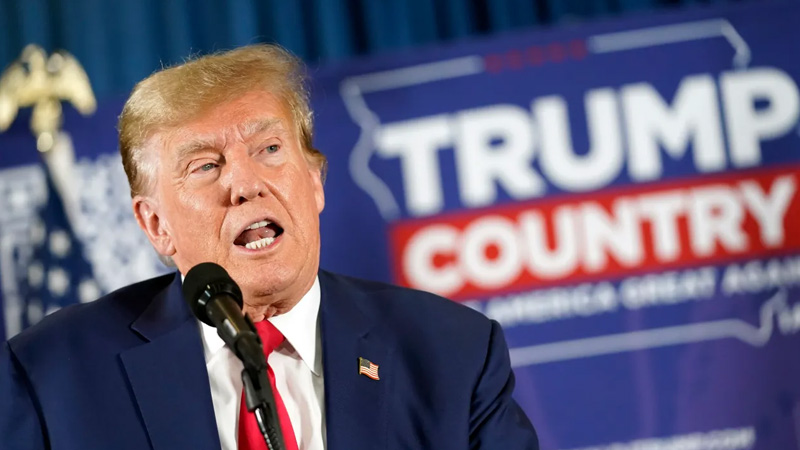“Voters Might Be Better Off with Kamala, But Here’s Why They Secretly Want to Be Like Trump!”

Photo Credit : Dinner ,Saul Loeb
Back in the 1970s and 80s, there was an American economist who became the darling of the conservative, small-state right. His name is Arthur Laffer, and he came up with what became eponymously known as the Laffer curve.
The theory is there’s a tipping point for taxation, where the higher the taxes become, the less revenue your treasury will collect. The argument is that people will employ ever more elaborate tax avoidance schemes – or just leave the country altogether.
Outside of academic and right-wing circles, not much was heard of Laffer in the intervening decades – but in 2016, he popped up to become an economic adviser to Donald Trump. And, indeed, Trump did cut taxes massively – for the wealthiest Americans.
He is promising to do more of the same if he wins the presidential election in November, and he is promising to fund the tax cuts by whacking tariffs on goods coming into the country, and imposing sanctions on those countries that don’t play by his rules.
So is Laffer – who was awarded the Presidential Medal of Freedom by Trump in 2019 – applauding? No, he most certainly isn’t. He has warned that “all this stuff of sanctions and threats of tariffs is not the right way to go. That’s a way of guaranteeing World War Three.”
But because Trump might be losing the right-wing intellectuals over fears of the ruinous consequences of trade wars, don’t think he’s losing the American people. Polls suggest that he enjoys a big lead over Kamala Harris when it comes to the economy.
Trump is threatening punitive measures against China and the EU (the former president has always had an obsession with Mercedes cars). Also in the cross-hairs are companies that have set up big manufacturing plants in Mexico as a way of accessing the US market. In some cases, Trump is warning he will impose 200 percent tariffs on Chinese electric vehicles made across the southern border.
It seems Americans love this tough talk. He wants goods made in America – and the audience at his rallies cheer. But when economists quietly point out that this could be massively inflationary, a lot of voters just seem to shrug. Would the family getting the kids kitted out for school rather go to Walmart and buy eight pairs of trousers made in Vietnam or the Philippines for $80, or one pair for $80 made in the US? It’s globalization’s conundrum.
Another Trump proposal is a massive extension of what you can leave in a will without paying inheritance tax – or estate tax, as it is called in the US.
None of this comes cheap. A major study from Trump’s alma mater, the Wharton School, found that his policies would add $5.8 trillion to the national debt, while Kamala Harris’ would only add $1.2 trillion.
There is something else, too. On most economic policies Harris’s economic proposals would be much more beneficial to the bulk of middle-class Americans (confusingly in the US, the middle class is what we would broadly refer to as the working class) – she wants to give tax credits to people starting up small businesses and to couples starting a family. She wants to offer help to families wanting to get their first rung on the property ladder.
It’s highly targeted. Harris wants taxes on corporations and the wealthiest individuals to pay for this.
All of this comes in a 10-day period where we have seen the Federal Reserve cut interest rates by 50 percent, and we’ve seen days of the stock market hit record highs (much more a preoccupation of Americans than people in Britain). Unemployment is low and inflation is in retreat.
So Harris has a good story to tell, and she can point to significant signs of improvement in the US economy – all of which raises the question; why the hell isn’t she doing better against Trump in polling on the economy? Sure, you would expect the wealthiest Americans who stand to gain most to like the sound of his tax cuts, but the rest?
To understand this is more about psychology than it is about economics. In Britain, one of the bugbears for Rishi Sunak in the general election was that he was rich – far too rich for the tastes of many. He would seek to play it down, talking about how he went without Sky TV as a teenager. We are suspicious of wealth.
But with Trump, it’s the reverse. He exaggerated his wealth, and brags about how he games the system. When Hillary Clinton chided him in one of the debates back in 2016 about how he didn’t pay his fair share in income tax, he shot back that he paid no income tax because he was smart. You just cannot conceive of a British politician ever saying anything like that.
And here’s the thing: a lot of Americans want to be like him. They want the private jets, the beautiful women and all the bling in Blingland.
I encourage you to look at one of the more recent posts from the former president on his social media platform, Truth Social. He is offering some lucky people the chance to buy a limited-edition gold and diamond Trump watch for – wait for it – $100k. No one has ever stood at the intersection of the shopping channel and politics like him.
Many of his blue-collar supporters dream of being that wealthy and being able to benefit from all the tax breaks that Trump is offering his well-heeled chums.
They may be better off with Harris. But what they dream about is being Trump better off.





